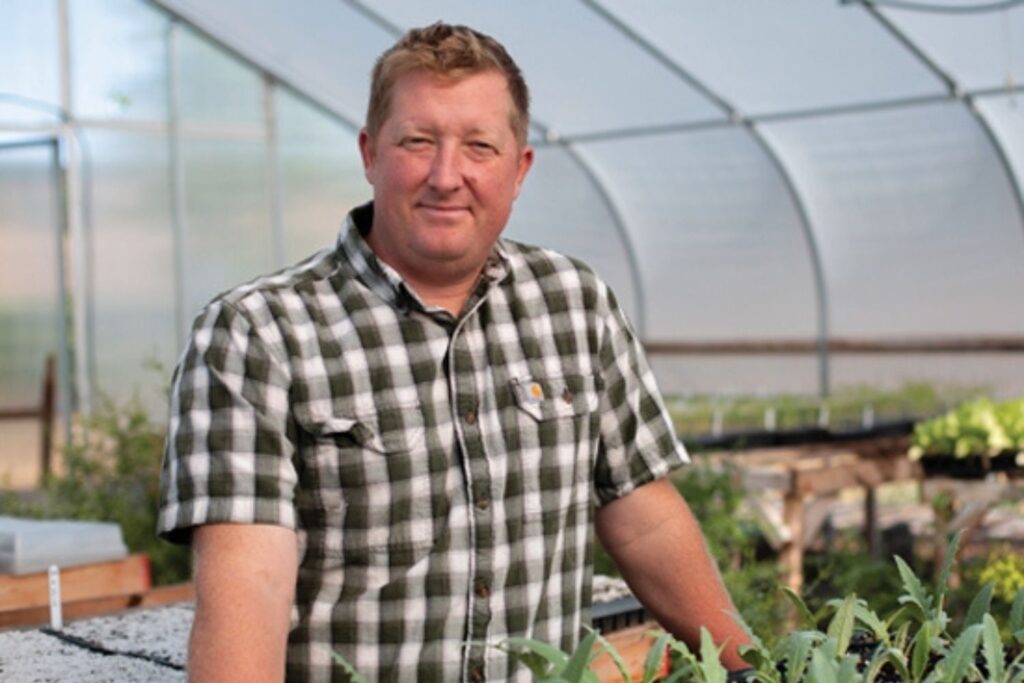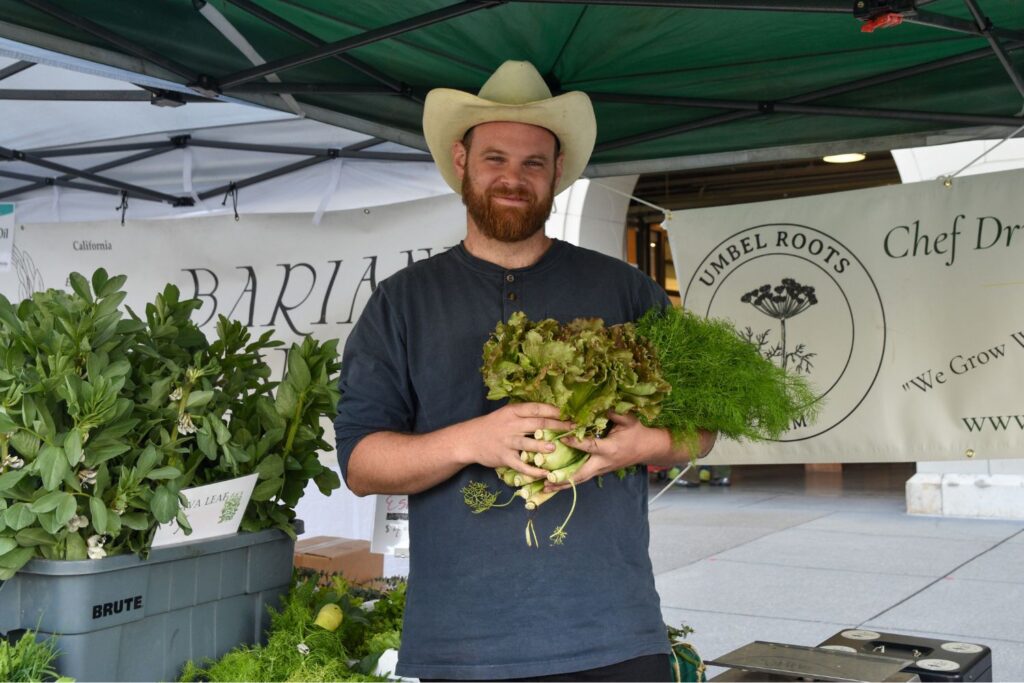Umbel Roots: Meet the Former Restaurateur Turned Organic Farmer Growing Chef-Driven Crops
Sheree Bishop, Communications Coordinator
April 18, 2025

William Henpenn’s approach to farming leans heavily on his extensive background as a restaurant owner and chef. His farm Umbel Roots, offers specialty crops like blue anise, hyssop, turmeric, sorrel, crosnes, and more. At first, William only worked directly with local restaurants like The Morris, Atelier Crenn, Lazy Bear, and Saison. Now at the Ferry Plaza Farmers Market, home cooks can shop just like the chefs who frequent their booth to source certified organic edible flowers, unique vegetables, and tender lettuces, all grown with soil health and flavor in mind.
From Chef to Farmer and Everything in Between
William’s culinary career includes a wide variety of roles, from owning and operating restaurants in Oregon for five years to being a beverage director at multiple restaurants in Manhattan. After six years in New York, William moved back to the West Coast and settled down in Napa, where he began growing vegetables in his backyard as he contemplated his next career move.
“One of my chef friends came over and was like, ‘I would buy all your vegetables.’ There are not very many farms in Napa and Sonoma. There’s a lot less than if you look at other counties,” William says. In 2015, he opened up a farm in Sonoma called Kicking Bull Farm, working primarily with restaurants. From December 2020 to September 2021, William started a second farm, Umbel Roots, on a new property in Petaluma.
In late 2021, after restaurant sales slowed down due to the pandemic, William closed Kicking Bull. He says that the experience taught him the benefits of diversifying what he offers to chefs. Now, on 8 acres of land in Petaluma, William grows edible flowers, medicinal herbs, and vegetables. He’s now preparing to lease another 25 acres on the same property to expand his offerings to include eggs, in partnership with Farmer Joy, and pasture-raised pork.
The geography of Umbel Roots is unique in that it presents many opportunities for growth, as well as some challenges, such as growing warm-weather crops like turmeric and young ginger.
“We’re three baseball throws away from San Pablo Bay. We’re right on Highway 37, and just south of us, there’s nothing else. There’s marshland, and then there’s the Bay. With all those factors, we need to figure out what we’re growing, and what grows best in our soils,” William says.
The property where Umbel Roots sits today was formerly a hemp farm, which was certified organic. “They just kept the property fallow and left the certification there. I came in with my own certification already, but you have to prove the lineage of the property. Ours was an easy transfer.”
Building on Organic to Go Biodynamic
In December, Umbel Roots will also be certified biodynamic. William describes biodynamic certification as being a step above the standard organic certification.
The Demeter Association is the only organization that certifies biodynamic farms and products all over the world. They define biodynamic growers as people who “use methods such as crop rotation, composting, and homeopathic sprays to cultivate the long-term health of the soil.” Everyone who earns Demeter Biodynamic Certification must meet the requirements of the National Organic Program, plus additional requirements around disease, pest, weed control, water conservation, and biodiversity.
Following biodynamic standards, Umbel Roots makes teas with compost, which are fed to plants instead of fertilizers, along with other sustainability practices, such as setting aside 10% percent of their acreage for biodiversity. “A lot of the farm is bee-friendly. We grow areas that aren’t necessarily to make money, but to bring in the pollinators and have bugs live there,” William says.
Balancing Soil Health and Profitability
Taking a holistic approach to agriculture, biodynamic farming is also tied to other beliefs about planting cycles and soil health, such as considering the moon cycle. “There are people who won’t plant on certain days of the lunar cycle because the moon is waning, and it’s not good for roots. We generally try to live around that, but we’re also a for-profit farm.”
While William subscribes to the general principles of biodynamic farming, the farm must also meet the business demands of consistently supplying produce to busy chefs and farmers market shoppers. “Biodynamics is soil health, really… That’s what the farm, for me, is about. I grow vegetables, but really, I create soil.”
Umbel Roots uses no-till farming methods and conserves water by using low-emitting sprinkler heads and growing multiple crops in one row. For instance, they’ll plant radishes next to onion starts and lettuce. The radishes are harvested first, in 21 days, then the lettuce in a month’s time, and then the onions two to three months later. Rather than rip up soil, they leave the soil as it is, nurture it, and reuse it. This is part of the reason why William insists on growing year-round, to continuously keep the soil healthy.
“Even just growing mint. One third of it is for flowers, one third of it is cut down to the very bottom, and the other third is left in a bed for us to harvest bunches from. That keeps the regenerative practice going,” William says.

Growing into the Bay Area Farmers Market Community
When William ran his first farm, he focused on selling to chefs and delivering CSA (community-supported agriculture) boxes. Umbel Roots continues to run the CSA now, even though the deliveries can be time-consuming. It was through this experience that he started to think about expanding his business model to include farmers markets.
“In my own experience with being a chef, I didn’t really go to farmers markets. The farmers came to me as a chef,” William says.
Fostering a community with chefs and shoppers at the market is helped by hiring staff who have also worked in restaurants. “Having the right people in the farmers market really does matter. Generally, the people we hire at the farm are former cooks and chefs who want to get out of the kitchen. Tom, who’s at the Ferry Plaza Farmers Market, he was one of the upper ends of Atelier Crenn. So, he understands products. We understand how to talk to chefs.”
As Umbel Roots continues to grow, so does its connection with the Bay Area culinary community, among amateur home cooks and seasoned chefs alike. “There’s an individual community within each farmers market… I’m excited to learn about each market and what it brings,” William says.
Topics: Chef, Culinary, Environment, Farms
